If you’re joining us just now, follow the snake’s tail to the Prologue or climb a ladder to the Table of Contents.
Chapter 23: Infinite Progression
In the loftiest tower of an infinite observatory, constructed on a plateau of infinite diameter, situated on the outskirts of the infinite city of Samarkand, the Three Magi sighed collectively in a state of infinite dismay. Turbaned Melchior fiddled with his astrolabe and checked the sky again, hoping he had miscalculated. Caspar curled his mustache and squinted at Balthazar who, wearing a jeweled mitre of infinite value, paced the vaulted chamber, sighing heavily.
The crystalline walls looked out onto an evening sky suffused with a coruscating red light that cut a gash across the expanse. Slow-moving planets traced courses through the vault of Heaven, leaving shimmering arcs in their wake. And these afterglows were magically replicated on the surface of the armillary sphere that stood on the raised platform in the center of the room.
The obsidian doors swished open and a cloaked wizard entered. The Magi bowed low before their master, the wizard, Dhabu’ Abd-Manat (Hyena, Slave of Manat). His face was decorated with diaphanous wards and symbols, luminous arabesques, that somehow were part of his visage without clinging to the cadaverous gray skin. It seemed a living tattoo, a veil of light, and its changing colors reflected the wizard’s unpredictable moods. Currently, the lights blazed between a faint azure and Alice blue, suggesting he was either exhausted or suffering from acid reflux.
He gazed down on the Magi with a sneer. “Balthazar, Caspar, Melchior, report.”
“Mars is in retrograde,” Melchior offered with a fading grin.
“It is always in retrograde in the Red Zone. Why have you summoned me?”
Balthazar licked his lips. “My Lord, the falling star you asked us to track has disappeared.”
“What?!”
Caspar pointed to a quadrant of the sky and remarked in a Brummie accent. “T’wuz right there, it wuz. Then, poof!—Gain! Wha cain ya do?”
The wizard seethed. “How is it that the Three Magi, the three wisest men in the universe, could manage to screw up this one simple task? I told you not to take your eyes off of that star, because it’s not a star, it’s the Chosen One, and it might try something tricky. Well, guess what?”
Balthazar sighed, “We failed, because we are out of practice.”
“He speaks the truth,” Melchior seconded.
“And practice mikes pirfect!” Caspar agreed. “Troof be told, we ain’t been on the lookout for a Chosen One for billions of years—”
“Hundreds,” Melchior corrected.
“’S wha I said, hoondrits.”
Melchior shrugged. “It is not a common thing for a divinity to walk among mortals.”
“’Cept Her Maijestay Cher,” Caspar observed. The other two Magi regarded their shoes. “Got all her raicords, I do.”
But Dhabu’ Abd-Manat was studying a different region of the sky. He raised his index finger, which became a laser pointer that shot a red dot onto the wall.
“There,” he whispered.
Melchior spoke. “Do you mean that comma of light emerging from behind Polaris?”
“The same,” the wizard grinned triumphantly.
The dot expanded and became the center of a video-game screen. A blur of computations and numbers appeared, calculating the azimuth, trajectory, and velocity of the Chosen One. The wizard raised his right hand and flicked his wrist four times to enhance the blip in the crosshairs. At last a tiny winged man could be seen falling through outer space.
“Impossible!” Balthazar interjected. “He was in the Ophiuchus constellation when he vanished.”
The wizard fumed. “Nothing is impossible!” He pressed a red button, because all buttons on the Astral Plane that initiated dramatic events were red.
From one end of the infinite observatory to the other, hydraulically operated hatches unfolded on all the domes and ancient towers. The courtyards, streets, and flat rooftops of Samarkand opened as well. And out of these apertures emerged a bristling array of gigantic telescopes. Some were forged of gold and brass, others were of cutting-edge design, with computer consoles behind which pointlessly helmeted and goggled henchmen sat on swivel chairs, turning gauges and dials, as they chattered to one another across a crackling and surprisingly outdated VHF communications system.
The telescopes turned on their bases until every lens was trained on the celestial anomaly that the demon wizard had identified.
“I must alert Manat,” he said, reaching into his leather pouch and removing a fistful of fairy dust. He cast it high overhead and muffled himself up in his cloak before fading away in a scintillating cloud of light.
—“Fookin’ hate that wainker.”
Trillions of light years away, in the nighted cisterns of the original Shattered City (of which all other versions were but defective copies), the Pre-Islamic goddess of Destiny, Manat, in the guise of a girl-child, wearing a mantle of false prophecy, waited for her servant to return.
She stared into eternity through eyes that were monstrous black-holes, devouring the eons while expelling jets of ionized matter that gave birth to new ones—eons whose histories and destinies she saw in a glance. If a mortal could have looked at the universe from Manat’s perspective, they would have been surprised to discover that the eyes they were peering out from were actually looking inward at ten copies of the goddess herself. Because Manat existed in eleven dimensions simultaneously, which she found rather limiting and a bit of a downer.
In her sempiternal loneliness, Manat had longed for a friend. And so, through an act of parthenogenesis, she brought forth an aspect of herself imbued with godlike powers, but ignorant of its own lack of autonomy and selfhood. As clever as Dhabu’ Abd-Manat thought he was, he did not realize that he was only an extension of herself—a pretentious little pinky finger. It pleased the demon queen to hear a masculine voice asking her questions and expressing boundless wonder at the subtlety and ingenuity of her responses.
He has just told the Magi that he must inform me as to where the mortal Evan is located.
“My Queen,” the wizard said, prostrating himself before her. “I have found the Man-Child. . .”
“Man-Cub.”
“Yes.” Again, she had humiliated him. “The Chosen One was hiding behind—”
“The north star. I know. But he wasn’t hiding. The unborn universe inside of him knew I had laid a snare for them in the Ophiuchus constellation. So it executed a sly coordinate transformation and repositioned him behind Polaris. But now that he is in the Red Zone, I cannot touch him, since it is a sanctuary. Track the Man-Cub’s movements and notify me when he leaves.”
She smiled to see the look of self-importance cross the wizard’s face. Poor fool. He had no idea that it would be she, Manat, tracking Evan. Not her puppet.
“My Queen, will you attempt to steal the Man-Cub’s dream again?”
“No. I no longer have those powers. And the Man-Cub has made it clear he will not surrender his dream to me. Therefore, he must be annihilated, not only in this universe but in every possible world that could ever be. Nothing will stand in my way, not even the Havasupai man who runs the gas station on the Astral Plane.”
“You are so wise, my Queen.”
“Thank you,” Manat replied. She had to throw him a bone to keep him from losing his sense of purpose. “You have done well. . .”
Dhabu’ Abd-Manat’s mood tattoo went ultraviolet because he was blushing.
“I live only to serve you.”
“I know,” she grinned.
When the wizard was gone, Manat closed her eyes (those black pools of primordial chaos), and affecting the voice of the Prophet Isaiah, said, “How art thou fallen from Heaven, O Lucifer, son of the morning. . .”
To the accompaniment of the 1968 recording of Chip Taylor’s “Angel of the Morning” (as performed by Merrilee Rush & the Turnabouts), Evan winged his way through a balmy nebula of red stardust. In every direction the celestial spheres, spinning on their visible axes, swept past him. They were fastened to rickety arms, some of which were hinged at the golden mean to permit them to swoop out in epicycles and complete evolutions that were (as Milton says) “regular then most when most irregular they seemed.”
It was a clockwork universe, a galactic orrery of stars, moons and planets, linked to a wide-slung web of levers, fulcrums, gears, and crankshafts, bound fast to the iron chain of Causality and held in place by the adamantine rivets of Necessity. Through a myriad of balance springs and oiled parts, the cosmos operated by the laws of celestial motion as imagined by Aristotle, Ptolemy, al-Biruni, Ibn Sina, Maimonides and many other great schoolmen and philosophers. And each and every one of these contradictory systems were equally valid in the Red Zone, reconciled as they were to Kepler’s laws of planetary motion (as updated by Newton) and overlaid with the “Many Worlds” theory of Giordano Bruno.
The interstitial aether was a material plenitude superimposed on an electromagnetic field. Evan had to swim, crawl, and fly through it. The medium served another purpose, as a kind of transparent whiteboard on which ripples of pink-white light resolved into mathematical symbols and formulae, geometric lines and spirals—or into detailed annotations, elucidating things like tensor decomposition and manifold regularization. But at other times, the lights in the sky simply wanted to say “here we are” and share their delight in the beauty of those isomorphic patterns and mathematical structures they were playing around with.
The movements of the planets, along with the quantum vibrations of those cleverly hypothesized one-dimensional strings (which only the inert singularity inside Evan could see), generated the sacred Diapason of the Pythagoreans, that fabled Musica Universalis, the Harmony of the Spheres, which turned out to sound exactly like the 1968 hit “Angel of the Morning”, as performed by Merrilee Rush & the Turnabouts, with the added charm of that faint tinny echo preserved in the original Bell Records studio recording of it.
The inert singularity was speaking to Evan telepathically in that donnish voice it had affected earlier in the dream. But Evan sensed the presence of Niyati in his heart and knew she was somehow with him as he made his way deep into this new and exciting region of the Astral Plane.
“Where are we?” Evan asked.
“You have traveled a trillion light years into the Red Zone.”
“I thought light was the fastest thing in the universe.”
“It is the fastest thing in the physical universe. But in this Hilbert space, which has no mass or matter, your movements are not limited to the physical laws you’re used to, nor is your progress impeded by physical objects.—Watch out!”
Evan swerved out of the way of an oncoming Soviet satellite, clipping the tip of his left wing on it. “Ouch! Son of a BITCH!—You know, I have no fuckin’ idea where I’m going!”
“Yes, I know. Poor boy. That’s been your problem since you were born. Do you see that rust-colored globe to the right? That’s where we’re heading. Planet Earth.”
“Why isn’t it blue?”
“Because we’re in the Red Zone. And be advised that this version of Earth is an infinite sphere, which means that, once you’ve entered its atmosphere, it will appear as a two-dimensional plane from your vantage point.”
“I know I suck at math. . .”
“Yes.”
“But there seem to be a lot of infinite things in this dream.”
“Yes.”
“Including infinite copies of myself and of everyone I know.”
“Yes.”
“But I thought infinity was the largest number there was.”
“Yes.”
“Stop saying yes! And tell me what’s going on!”
“Do you recall telling Marcus and Levi in February last year how you would create a universe if you could?”
“You mean the night I got drunk on vodka and smoked a joint and started talking about math?”
“Yes.”
“I vaguely recall it, but can’t remember the details.”
“Let me help you.”
—Suddenly Evan was on his bean-bag chair in his apartment off the UCLA campus, and Levi and Marcus (both sober) sat across from him. He took a hit from the joint and coughed, which caused him to spill some of the vodka, but he didn’t notice this because he was warming to his subject. “The way I see it, there’s, like, only three numbers: 0, 1, and infinity. . .”
Marcus bobbed his head and said, “My professor said those are considered the only simple numbers.”
“Yeah, I know. . .” Evan said, even though he didn’t. “What I was trying to say was that, if I was, like, a god. . .” (Levi covered his ears) “And if I could create a universe, I’d prolly make it out of those three numbers, and they’d be like the atoms and stuff.”
“It’s getting late,” Levi remarked.
Marcus was giggling. “That’s the lamest universe I’ve ever heard of. How would it work?”
“I dunno, like, maybe 0 would be mass and 1 would be velocity. And infinity would be momentum. Some shit like that. . .”
Levi yawned.
Marcus rolled his eyes. “Evan, setting aside the fact that numbers don’t have those properties, in your universe, if mass equalled 0 and velocity was 1, momentum (as the product of the two) would be 0, not infinity.”
Evan set his vodka on the stand next to him, doused the joint in the ashtray, and wagged his finger at Marcus. “But what you don’t understand is that, in my world, 0 would be the flip-side of infinity.” He leaned back in his bean-bag chair, touched his head and said, “That actress with the short black hair on Northern Exposure is really hot. What’s her name?” Then he passed out.
—“Why did you show me that?” Evan asked.
“I showed it to you, so that I could explain that in this Hilbert space the universe you came up with while your mind was impaired exists.”
“That can’t be. That was just a dumb idea I had—a random neuron sparking in my brain. I come up with stupid shit like that all day long.”
“The beauty of this Hilbert space, which we call The Red Zone, is that it can accommodate every idea that has ever been imagined, including stupid ones. How do you think these contradictory cosmological systems and infinite dreamscapes you keep passing through seem to be so seamlessly integrated in your dream? They’re all entangled, you see.”
“I thought those aliens were regulating everything.”
“What? The Satcitanandans? No. The only reason they are able to manipulate time in your dream is that you have granted them the power to do so. It’s not so easy to reverse time’s arrow.”
“Then how did you do it just now, when you took me back to that night last year?”
“I propelled you forward into a series of contiguous phase spaces of reduced entropy that created the illusion you had been shunted back into the past. It was highly improbable, but not impossible—at least in this Hilbert space.”
“You keep calling it this Hilbert space. Are there others?”
“You tell me. It’s your dream.”
“How did this Hilbert space find its way into my dream? I thought we were on the Astral Plane.”
“You are. The Astral Plane is the receptacle in which this Hilbert space is contained.”
“But if this Hilbert space contains every idea that has ever been thought up, then shouldn’t the Astral Plane be contained in it?”
“Oh, look. We’ve been chattering like magpies and have already entered Earth’s atmosphere.”
Sloping towers and exotic domed structures covered the planet’s surface in between lush greenery. Overhead, artificial moons floated under the stratosphere in relief against a hazy sunset.
“This is not the planet Earth I know.”
“Are you sure you know the planet Earth you come from?”
“What do you mean?”
“You were born on the planet Earth, where the sun rises in the west and sets in the east, where the Temple City of Shambhala is as real as Galveston, Texas, where the holy city of Varanasi is a place of myth and legend, and where unborn universes are as common as the fireflies they mingle with. Has it never occurred to you, Evan, that a place so utterly absurd could not possibly exist?”




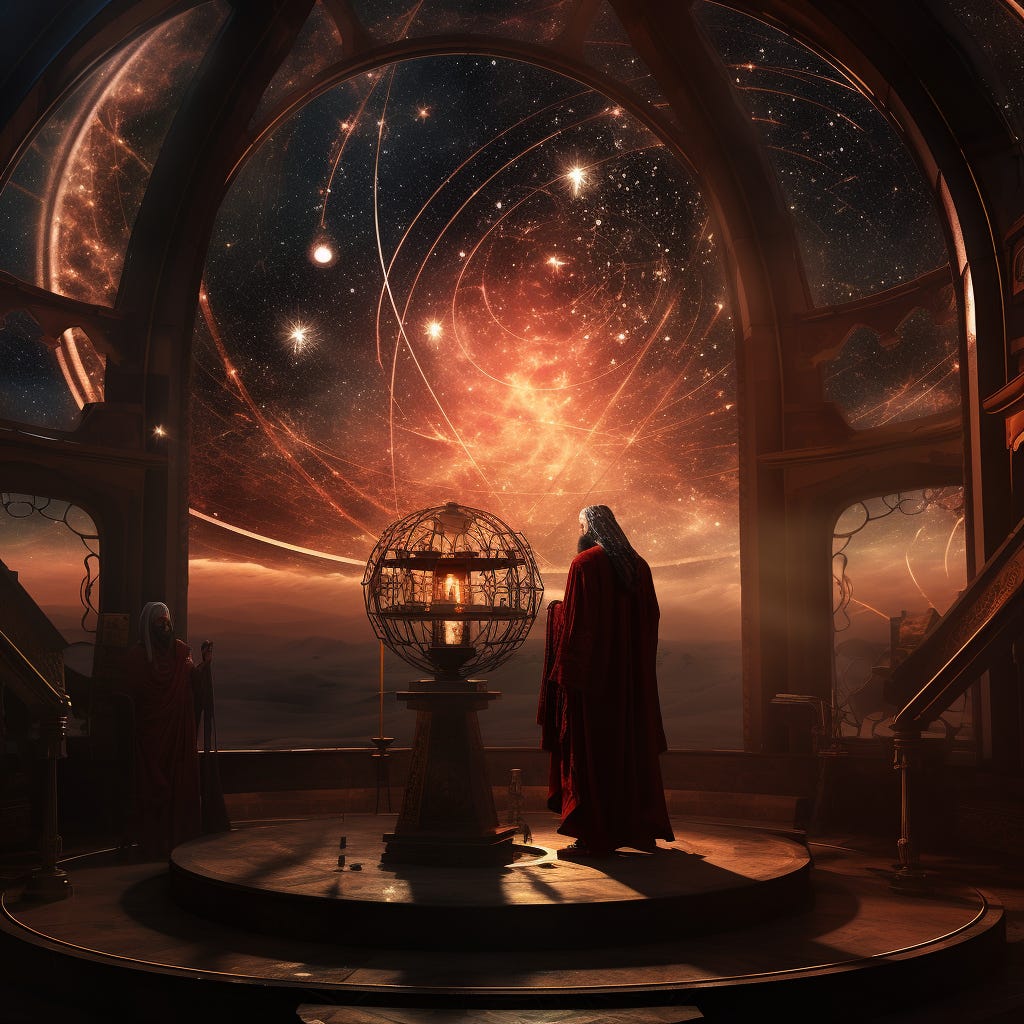
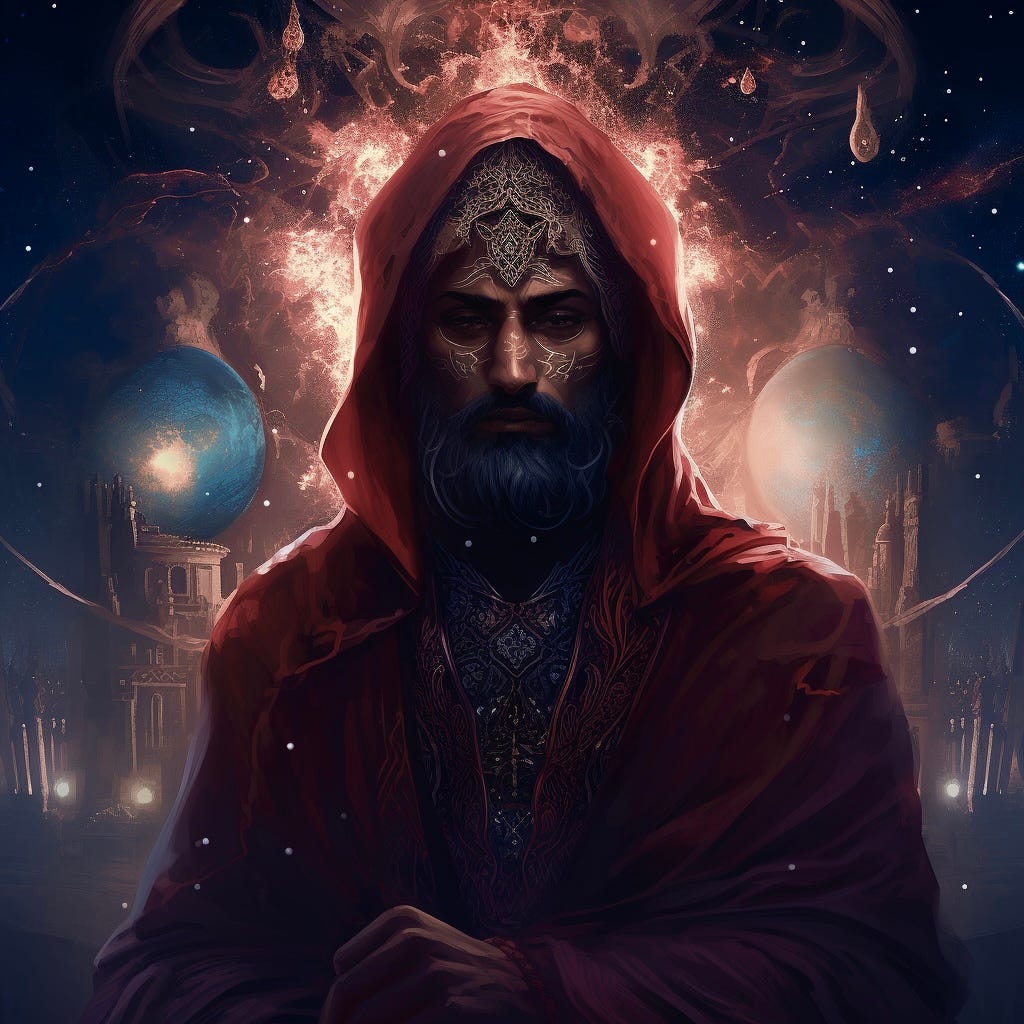
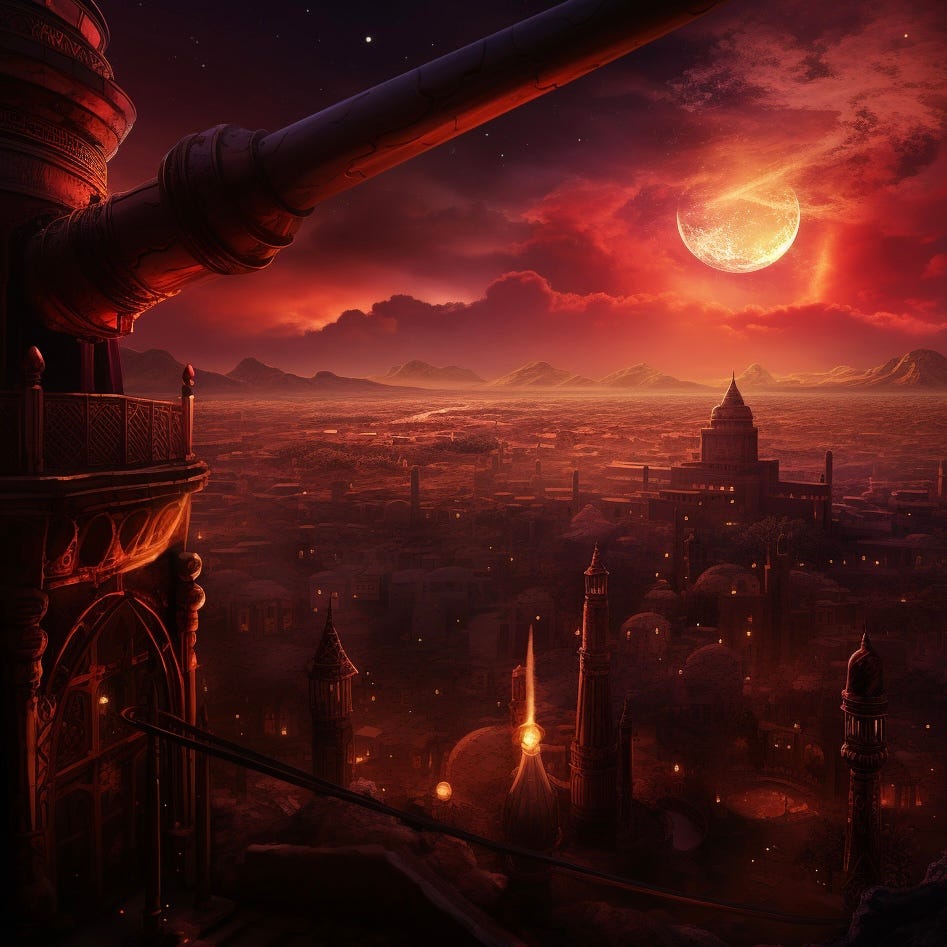
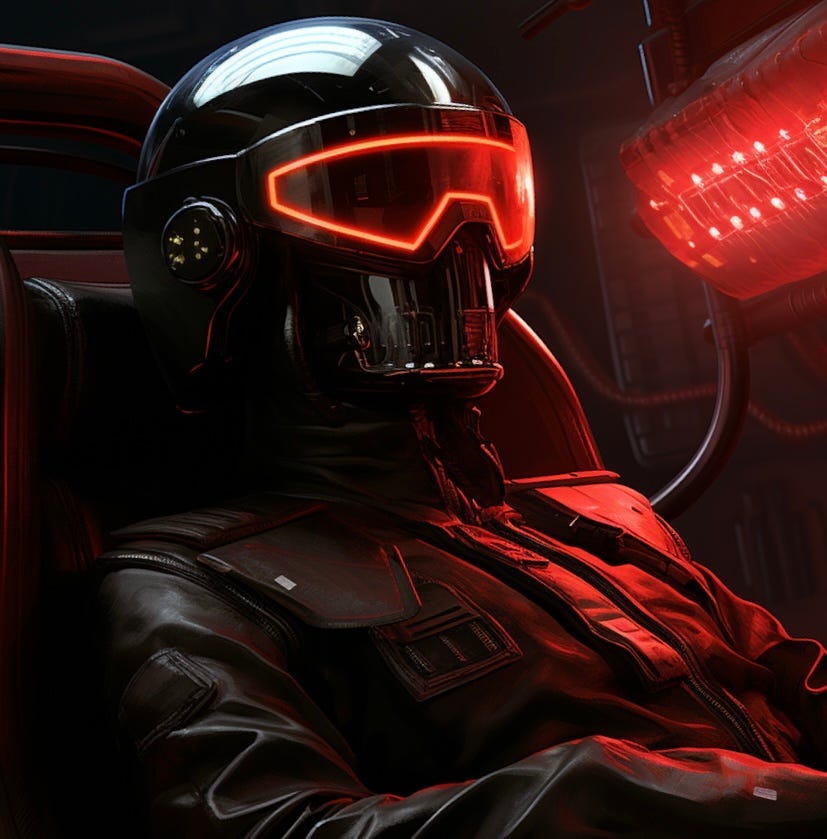


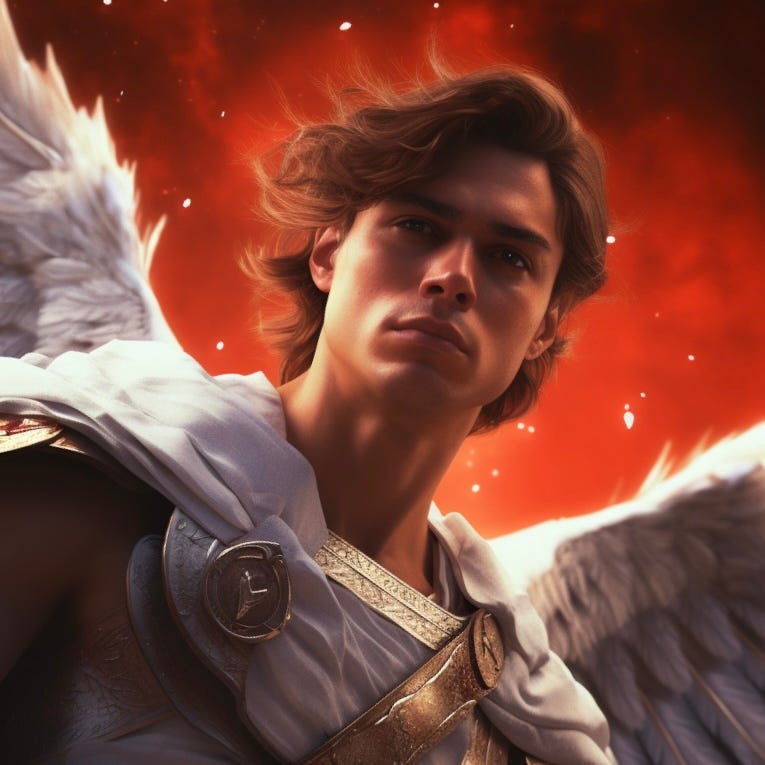
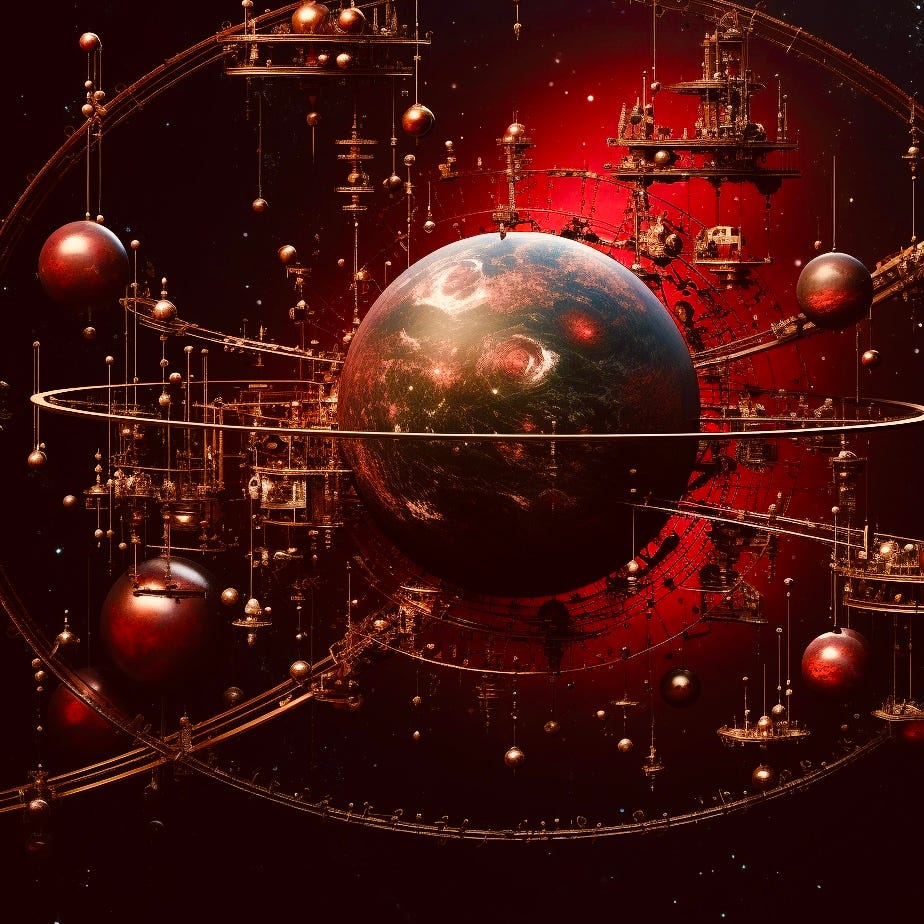
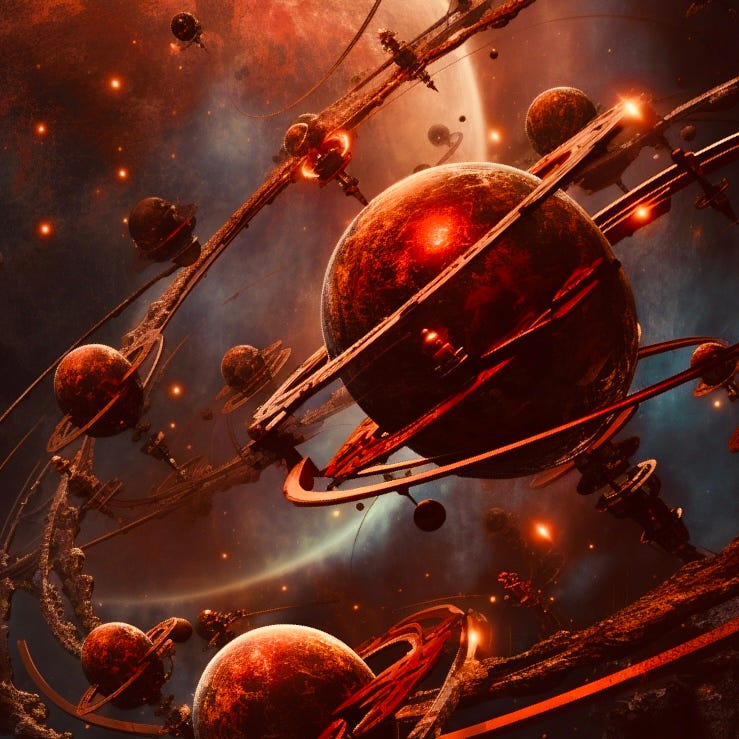
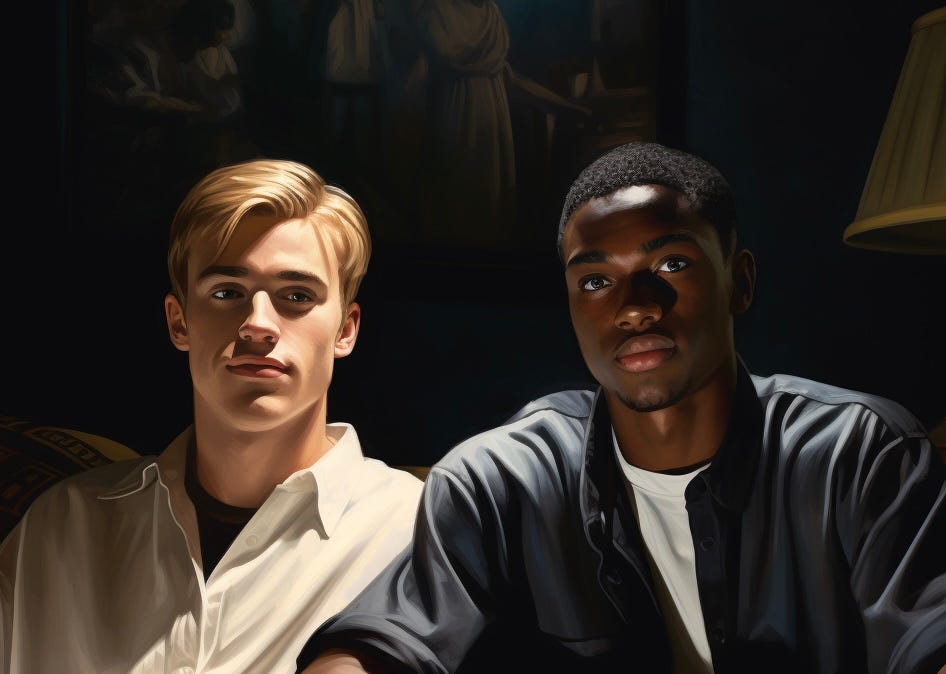
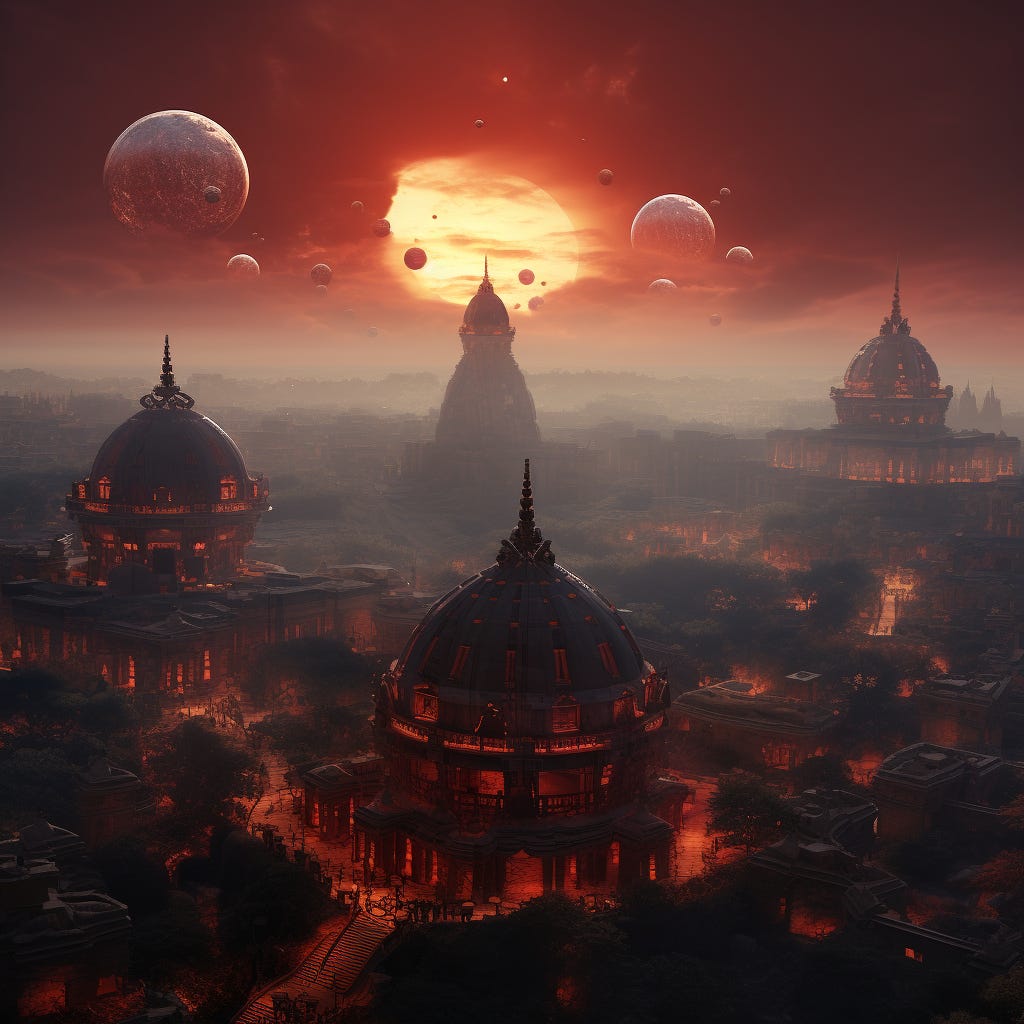

This is amazing writing and is extremely complex. I can write fantasy but could never write something like this.